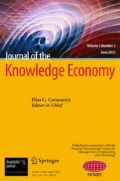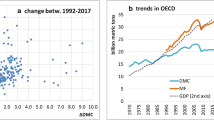Abstract
The term smart growth is associated with the necessary paths to achieve a sustainable course of economic development. Though being a modern term, it crystallises the tradition of the classical political economy regarding the role of technical change, population control and sustainability. John Stuart Mill is the classical economist who provided the theoretical framework of the term. By stressing the role of knowledge and environmental protection, core tenets of smart growth, he illustrates the macro (long-run) perspective of economic development. His notion of the ‘Stationary State’ includes these elements which are driving smart growth. By showing the differences into the mechanics of knowledge J.S. Mill shows that the historical distinction between ‘West and East’ countries is seated on the uneven diffusion of knowledge among people.
Similar content being viewed by others
Notes
The word metakenosis (english translation. ‘Diffusion’) appears within the context of the New Testament and is used here to describe the generalised distribution of knowledge among people.
Thanks to an anonymous reviewer for bringing this into my attention.
References
Ahmad, I. (2017). Religion as critique: Islamic critical thinking from Mecca to the marketplace. The University of North Carolina Press.
Alexander, D., & Tomalty, R. (2002). Smart growth and sustainable development: Challenges, solutions and policy directions. The International Journal of Justice and Sustainability, 7(4), 397–409.
Balcerowicz, L., & Rzonca, A. (Eds.). (2015). Puzzles of economic growth. Directions in Development. World Bank Editions.
Beate, J. (2005). Barbarian thoughts: Imperialism in the philosophy of John Stuart Mill. Review of International Studies, 31(3), 599–618.
Begg, I. (2010). Europe 2020 and employment. Intereconomics, 3, 146–151.
Bell, D. (2010). “John Stuart Mill on Colonies”. Political Theory, 38(1), 34-64.
Buckle, H. T. ([1858]. (2011)). History of civilisation in England Cambridge University Press.
Buckley, M. (2011). John Stuart Mill and the idea of a stationary state economy. In C. Dierksmeier, W. Ammann, E. von Kimakowitz, H. Spitzeck, & M. Pirson (Eds.), Humanistic Ethics in the Age of Globality Palgrave Macmillan, 137(147).
Burns, J. H. (1976). The light of reason: Philosophical history in the two Mills. In J. Robson & M. Laine (Eds.), James and John Stuart Mill-Papers of the Centenary Conference (pp. 3–20). University of Toronto Press.
Carayannis, E. G., & Campbell, D. F. J. (2012). Mode 3 knowledge production in quadruple helix innovation systems. Springer International Publishing, New York, NY-Dordrecht-Heidelberg- London, available at https://doi.org/10.1007/978-1-4614-2062-0
Carayannis, E. G., Grigoroudis, E., Campbell, D. F., Meissner, D., & Stamati, D. (2017). The ecosystem as helix: An exploratory theory-building study of regional co-opetitive entrepreneurial ecosystems as Quadruple/Quintuple Helix Innovation Models. R&D Management, 48(1), 148–62.
Daly, H. E. (1973). Toward a Steady-State Economy. W.H. Freeman.
de la Vega Hernandez, I. M., & de Paula, L. B. (2020). The quintuple helix innovation model and brain circulation in central, emerging and peripheral countries. Kybernetes, 49(9), 2241–2262.
Downs, A. (2005). Smart growth: Why we discuss it more than we do it. Journal of the American Planning Association, 71(4), 367–378.
Durand, C. P., Andalib, M., Dunton, G. F., Wolch, J., & Pentz, M. A. (2011). A systematic review of built environment factors related to physical activity and obesity risk: implications for smart growth urban planning. Obesity Reviews, 12, 173–182.
Freilich, R. H., & Popowitz, N. M. (2010). The umbrella of sustainability: smart growth, new urbanism, renewable energy and green development in the 21st century. The Urban Lawyer, 42(1), 1–39.
Harris, A. (1956). John Stuart Mill’s theory of progress. Ethics, 66(3), 157–175.
Hayek, F. (1945), “The Use of Knowledge in Society”. The American Economic Review, 34(4), 519-530.
Kurz, H. D. (2013). Innovation, knowledge and growth: Adam Smith, Schumpeter and the Moderns. Taylor and Francis.
Malthus, R. ([1798]. (1826)). An essay on the principle of population. London: John Murray, Albermarle Street.
Manioudis, M. (2020). J.S. Mill and the Irish land question: From Irish economic history to coherent socialism and Irish historicism. Irish Economic and Social History. https://doi.org/10.1177/0332489320933059
Marangos, J. (Ed.). (2012). Alternative perspectives of a good society. Palgrave Macmillan.
Meramveliotakis, G. & Manioudis, M. (2021). History, knowledge and sustainable economic development: The contribution of J.S. Mill’s grand stage theory. Sustainability, 13(3), 1468. https://doi.org/10.3390/su13031468
Mill, J. S. ([1848]. (1909)). Principles of political economy with some of their applications to social philosophy. London, New York and Toronto: Longmans-Green and Co.
Mill, J. S. (1874). Dissertations and discussions: Political, philosophical and historical. Henry Holt and Company.
Mill, J. S. (1969). Essays on ethics, religion and society. Routledge and Kegal Paul.
Mill, J. S. (1977). Essays on politics and society (ed. J.M. Robson). Toronto: University of Toronto Press- Routledge and Kegan Paul.
Mill, J. S. (1985). Essays on French history and historians (ed. J. Robson). University of Toronto Press- Routledge and Kegan Paul, Toronto.
Mill, J .S. (1986). Newspaper writings: December 1822-July 1831, (ed. Ann Robson and J. Robson). Toronto: University of Toronto Press- Routledge and Kegan Paul.
Mlynarzewska-Borowiec, I. (2020). Does implementation of the smart growth priority affect per capita income of EU countries? Empirical analysis of the period 2000–2017. Journal of the Knowledge Economy. https://doi.org/10.1007/s13132-020-00670-0
O’ Connor, M. (1997). John Stuart Mill’s utilitarianism and the social ethics of sustainable development. The European Journal of the History of Economic Thought, 4(3), 478–506.
Roemer, P. M. (1990). Endogenous technological change. Journal of Political Economy, 98(5), 71–102.
Sandmo, A. (2015). The early history of environmental economics. Review of International Economics and Policy, 9(1), 43–63.
Schumpeter, J.A. (1954). History of Economic Analysis, London & New York: Routledge
Stephens, P. (2014). John Stuart Mill: The greening of the liberal heritage. In P. F. Cannavaro and J.H. Lane, Engaging Nature: Environmentalism and the Political Theory Canon, 189–204, MIT Press.
Talen, E. (2003). Measuring urbanism: Issues in smart growth research. Journal of Urban Design, 8(3), 195–215.
Warner, D. M. (2006). Commentary: “Post-growthism”: from smart growth to sustainable development. Environmental Practice, 8(3), 169–179.
Weber, M. ([1905] 2002), The Protestant Ethic and The Spirit of Capitalism, London: Penguin Books
Wilson, F. (1998). “Mill on Psychology and the Moral Sciences”, in J. Skorupski (ed.), The Cambridge Companion to Mill, Cambridge: Cambridge University Press: 203-254
Ye, L., Mandpe, S., & Meyer, P. (2005). What is ‘smart-growth?’ – Really? Journal of Planning Literature, 19(3), 301–315.
Author information
Authors and Affiliations
Corresponding author
Additional information
Publisher's Note
Springer Nature remains neutral with regard to jurisdictional claims in published maps and institutional affiliations.
Rights and permissions
About this article
Cite this article
Manioudis, M. An Early Anticipation of Smart Growth? John Stuart Mill, Knowledge and the ‘East-West’ Distinction. J Knowl Econ 13, 2164–2176 (2022). https://doi.org/10.1007/s13132-021-00809-7
Received:
Accepted:
Published:
Issue Date:
DOI: https://doi.org/10.1007/s13132-021-00809-7




